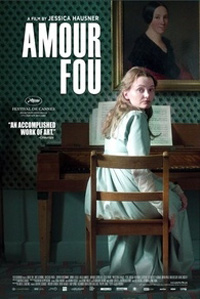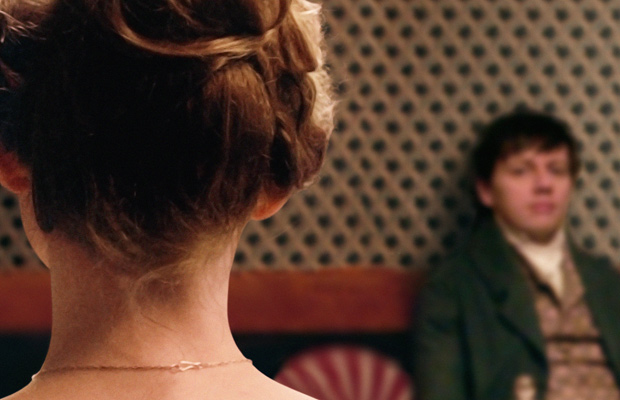Disc Reviews
Amour Fou | Blu-ray Review
 It’s with great pleasure to see Austrian director Jessica Hausner’s fourth feature Amour Fou available on Blu-ray in the US, considering several of her previous exemplary titles have failed to secure distribution altogether. Winner of Best Screenplay and Best Film Editing at Austrian Oscars, premiering her latest at the 2014 Cannes Film Festival in the Un Certain Regard sidebar, it’s an innovative exploration of the strange thing called love. Film Movement released the title in three theaters in early summer of 2015, and only managed to rake in around thirteen thousand in a three month run. Although it ultimately didn’t manage to heighten Hausner’s international profile as much as one would’ve hoped, with a little luck this should end up on some year-end best lists and continue to grasp a wider, more deserving audience.
It’s with great pleasure to see Austrian director Jessica Hausner’s fourth feature Amour Fou available on Blu-ray in the US, considering several of her previous exemplary titles have failed to secure distribution altogether. Winner of Best Screenplay and Best Film Editing at Austrian Oscars, premiering her latest at the 2014 Cannes Film Festival in the Un Certain Regard sidebar, it’s an innovative exploration of the strange thing called love. Film Movement released the title in three theaters in early summer of 2015, and only managed to rake in around thirteen thousand in a three month run. Although it ultimately didn’t manage to heighten Hausner’s international profile as much as one would’ve hoped, with a little luck this should end up on some year-end best lists and continue to grasp a wider, more deserving audience.
Hausner reveals her strongest work yet, a droll, romantic exploration of sorts that manages to expertly blend her unique tone with exquisite digital compositions from her longtime cinematographer Martin Gschlacht. In comparison to their first outing together, 2001’s Lovely Rita, their mastery of the digital image couldn’t be more strikingly apparent. Whereas that film’s complex subject suffered greatly from the rather jarring presentation of image and jagged zooms, here they’ve controlled the medium fantastically. The film’s look is so remarkably beautiful that non-German speakers will be hard pressed to keep up with subtitles as they soak in her unique tale of dying for love.
In 1811 during the last several months of German poet Heinrich von Kleist’s (Christian Friedel) life, his search to find a partner in death reached its inevitable denouement when he took both his own life and that of mistress Henriette Vogel (Birte Schnoeink). But leading up to this scenario, we’re introduced to a rather arid world of banal congregations upon which the melancholic poet often interjects his presence. Previously enamored with his cousin, Marie (Sandra Hueller), who continually rejects his weird advances, he begins to set his sights on a new romantic interest when he is introduced to Mrs. Vogel. Henriette is an avid fan of the poet. Though currently married to Peter (Stephan Grossmann) and mother of a young child, she seems equally out of sync with the social surroundings, as most of the others in their aristocratic circle seem more hell-bent about current tax reform that will finally see all classes of people paying taxes.
While Henriette begins to suffer considerable dizzy spells, an initial diagnosis seems to determine that she needs to get out and about more often, leading her husband to approve of his wife’s excursions with Heinrich. The rather mopey poet immediately plies Henriette with his plans to find someone who will love him enough to die together with him in a double suicide. Henriette seems weirded out, but another diagnosis based on a rudimentary analysis of her urine predicts a malignant tumor is causing the dizzy spells and she hasn’t long to live. And so, Henriette begins to consider the possibility of a romantic entanglement with the lonely poet.
Related through a series of droll episodes, many of which are set at dinner tables or gatherings involving musical interludes, Amour Fou unfolds matter-of-factly. There really isn’t any prerequisite as far as knowledge of von Kleist and his ensuing scandal goes, though it provides the provocative basis for Hausner’s latest, which explores a strange relationship between two characters in a tone not too far from her last film, 2009’s Lourdes.
For their parts, Friedel and Schnoeink are increasingly entertaining as they navigate their weird exchanges. Upon learning she’s terminally ill, Henriette flings herself upon Heinrich after rejecting him. When he learns of the reason for her change of heart, he seems hardly pleased. Of course, this culminates in the inevitable plan the poet originally outlines, yet Hausner’s finale still manages to be presented with a shock.
A handful of laugh old loud exchanges transpire throughout Amour Fou (including an excellent dinner sequence where an unplanned for guest interrupts a hangout session), which, like Hausner’s previous three features contain their own bizarre energies. Regardless of the narrative content, this film is certainly her handsomest yet, expertly framed shot compositions capturing the sterile and depressing interiors with arresting alacrity and generous detail. It’s a truly a film you don’t want to look away from.
Disc Review:
While Film Movement continues to branch out into Blu-ray with its Classics label, Amour Fou is the first contemporary title from the distributor to be released on Blu-ray, and it’s a very fitting one to begin with. DoP Martin Gshlacht’s exquisite, painterly frames are deserving of this enhanced transfer, presented in 1.85:1. A commentary track with Hausner is also available.
Hausner Interview:
An eight minute interview with Hausner has the director speaking on the film’s origins. Initially, Hausner conceived of the project a decade ago and wrote a script she was unhappy with until she found a way to mix the absurdity and banality of the scenario.
Deleted Scenes:
Four deleted scenes (two of them dream sequences) are included, about eight minutes of footage altogether.
Oida:
This short film directed by Hausner was for the musical duo Attwenger. For an additional three minutes of entertainment, this is well worth a look.
Final Thoughts:
Amour Fou would have been a great selection for Austria’s Oscar submission for Best Foreign Language film, though the sensationalism of another 2014 premiered title, Goodnight Mommy (a title Martin Gschlacht also worked on) seems to have usurped all the attention. Austere, droll, and more than a bit bizarre, Hausner continues to provide us with curious glimpses at human relationships. Having navigated dramatic features with Lourdes (2009), Lovely Rita (2001), as well as moody genre in the underrated Hotel (2004), Hausner proves to be equally adept with wry comedy in this inspired period piece.
Film Review: ★★★★/☆☆☆☆☆
Disc Review: ★★★½/☆☆☆☆☆



































